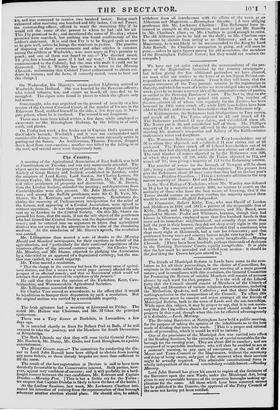We have not yet quite exhausted the memorandums of the
pro- gress of the Registration furnished by the country newspapers ; but before giving the few additional particulars we have gleaned, we must refer our readers to the letter of an intelligent Bristol cor- respondent in a subsequent column. From it they will learn, that the meagre statement of the Tory journals relative to the registration in that city, and which for want of a better we were obliged take up with last week, gives by no means a correct idea of the comparative state of parties, as settled in the Revising Barristers' Court. The fiwt is, that on the objections the Liberals have gained $44 votes. The number of freemen—almost all of whom vote regularly for the Tories—has been lessened by 1305 votes struck off; while 1396 househo/ders have been added to the list; and it is on the householders that the Reformers rely.
At Kidderminster, the Reformers took 33 objections to Tory names, and struck off 13. The Tories objected to 42, and struck off 13. The Reformers preferred 11 new claims, and established them all. The Tories put in $0, and established half of them. Mr. Phillips's majority of 73 is not therefore affected by the registration, notwith- standing Mr. Godson's tea-parties and flattery of the Kidderminster tradesmen's wives and daughters.
The Worcester Reformers struck off 49 Tory householders out of 96 to whom they objected, and established 11 new claims out of 21 preferred. The Tories struck off 37 Liberal householders out of 64 to whom they had objected, and sustained 6 new claims out of 37 made. The total number of names objected to by the Reformers was 326, of which they struck off 191, while the Tories objected to 115, and struck off 70; thus giving a majority of 121 to the Reforming interest.
The number of voters for the borough of Newport will be about 520; being a great increase upon the first register. The present lists give the Reformers about 30 more votes than they had on the last year's register.—Briyhton Guardian. [This is a welcome addition to the very narrow majority of Messrs. Ord and Hawkins.1 In the West Riding of Yorkshire, where Mr. Wortley was defeated in May last by a majority of nearly 8000, we venture to assert, on the authority of those who have the best means of knowing, that if the Tories should venture on another combat, the majority against them would be near 6000.—Shetfield Independent.
At Gloucester, Robert Kirby, Esq., who was Sheriff of London and Middlesex in 1816 and 1817, a partner of the respectable firm of Kirby, Beard, and Kirby, pin-manufficturers, and Mr. Beard, were rejected by Messrs. Peake and Whitmore, because, though they had houses in Gloucester, employed more than five hundred hands in that town and its immediate neighbourhood, and actually slept more than half the year in their houses, they did not sleep every night in the year in them. The same sapient gentlemen decided that a coachman, who slept every night at Monmouth, had a vote for Gloucester; and that gentlemen having town and country houses might vote for both. The decision in the case of Mr. Kirby is quite inexplicable.—Morniey Chronicle. [There have been hundreds, perhaps thousands of decisions in the Revising Barristers' Courts, equally inexplicable. It is plain that the law must be amended and settled next session : it should be the first thing the Crown lawyers attend to.]


























 Previous page
Previous page